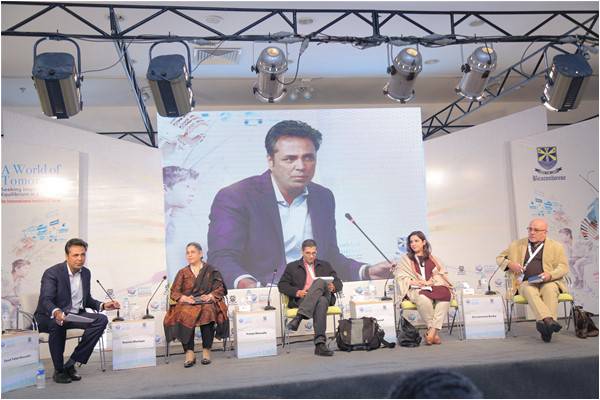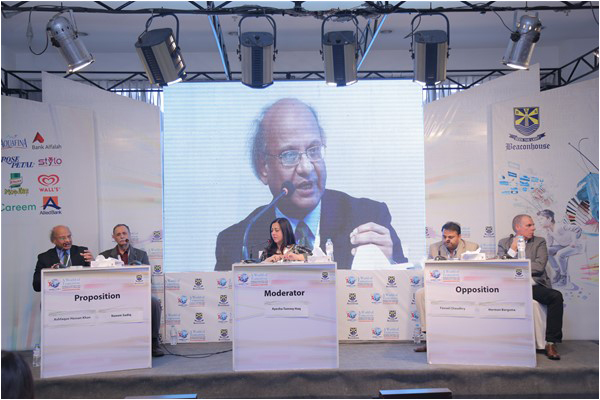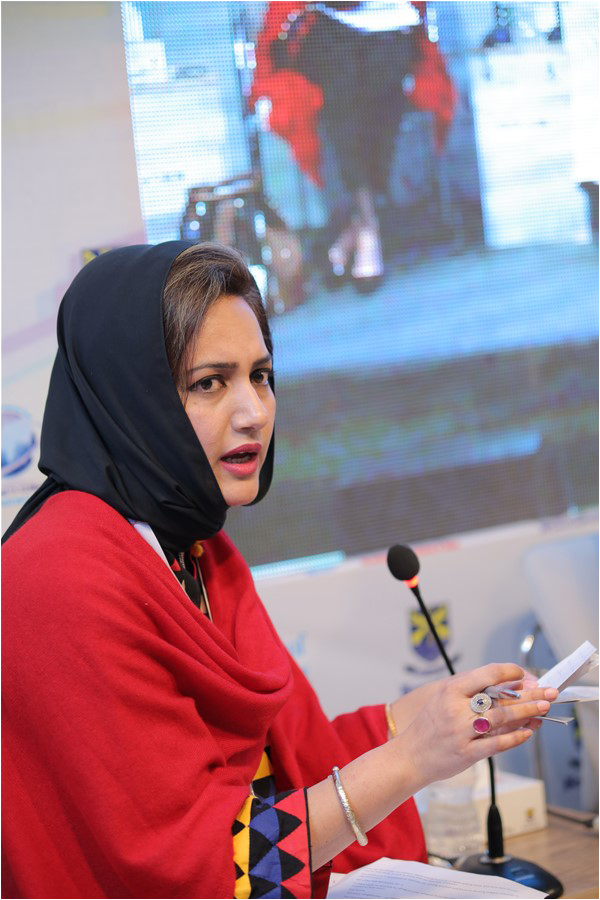
It is often noted that different cultures perceive time differently. ‘Past, present and future’ thus vary from nation to nation, leading amongst other things, to a number of studies on the correlation between a nation or culture’s long-term/future orientation and its economic success. Whether or not there is any basis to those generalisations is up for debate, but it may safely be said that Pakistan has typically scored poorly.
There could be many reasons for this, including data sources (affected by literacy rates and access to the Internet), sample size and selection, cultural bias, belief systems and so on – clearly this writer is sceptical – but let us assume for a moment that they are right and Pakistan is not a ‘future-oriented’ nation. The School of Tomorrow (SOT) events are trying to change that, with the improbable-sounding claim of reimagining the very future of humanity.

Held in November 2015 in Karachi, November 2016 in Lahore and March 2017 in Islamabad, the format of the SOT events is similar to that of literary festivals. However that is where the similarity ends. Their panel discussions, workshops, debates and interviews are overtly and categorically focused on the future, exploring it through five perspectives or dimensions: ‘A Digital Future’, ‘A Balanced Future’, ‘A Safer Future’, ‘An Inclusive Future’ and ‘An Expressive Future’. Any particular topic can, and probably does, belong to more than one of these categories. These dimensions have evolved since the event in Karachi, in which ‘Schools and Society’ formed an additional dimension - the latter two events acknowledged the ubiquity of that perspective across all discussions.
Organised by Beaconhouse, the purpose of the SOT events is to engage in meaningful discussion about a range of topics that affect society, humankind and of course education. These discussions are not intended merely as entertaining conversations between well-known personalities based on their areas of expertise and disciplinary backgrounds – they are meticulously curated to be forward-looking and outcome-driven. What this means is that the outcomes that emerge, for example, from a panel discussion on gender identity, will inform future policies and practices at Beaconhouse schools. This, in turn, will affect more than 285,000 students, numerous teachers and administrators, and create a ripple effect on their homes and communities. Or so it is hoped.
For Geert Hofstede, one of the dimensions of national culture is its ‘long-term orientation’, which describes how every society has to maintain some links with its own past whilst dealing with the challenges of the present and the future. High scores in this dimension indicate societies with a culture that is more pragmatic than normative, and that “encourages thrift and efforts in modern education as a way to prepare for the future.” Pakistan has been given a score of 50, indicating that “the culture of Pakistan cannot be said to indicate a preference”. Leaving the question aside of how they arrived at this particular score, perhaps the SOT events can serve as a tipping point towards greater “pragmatism** - if indeed that is desirable.

The thing about education is that it is supposed to be inherently future-oriented, in that its aim is to prepare students for whatever lies ahead. Yet the rapid rate at which change is taking place and the increasing unpredictability of the future leaves many of us feeling unsettled, with fears about technology, confusion about climate change, anxiety about what our children need in order to survive all that awaits them and a plethora of dystopian visions.
Conversations about the future allow us to begin to address some of our fears about the future. For a start, we acknowledge that many of the fears are, in fact, still within the realm of imagination. And if the collective imagination is capable of generating anxiety, then why can it not, conversely, reimagine the shape of the future together?
Perhaps, a future that we can anticipate instead of fearing - a better, brighter future for humanity?
There could be many reasons for this, including data sources (affected by literacy rates and access to the Internet), sample size and selection, cultural bias, belief systems and so on – clearly this writer is sceptical – but let us assume for a moment that they are right and Pakistan is not a ‘future-oriented’ nation. The School of Tomorrow (SOT) events are trying to change that, with the improbable-sounding claim of reimagining the very future of humanity.

These discussions are not intended merely as entertaining conversations between well-known personalities based on their areas of expertise
Held in November 2015 in Karachi, November 2016 in Lahore and March 2017 in Islamabad, the format of the SOT events is similar to that of literary festivals. However that is where the similarity ends. Their panel discussions, workshops, debates and interviews are overtly and categorically focused on the future, exploring it through five perspectives or dimensions: ‘A Digital Future’, ‘A Balanced Future’, ‘A Safer Future’, ‘An Inclusive Future’ and ‘An Expressive Future’. Any particular topic can, and probably does, belong to more than one of these categories. These dimensions have evolved since the event in Karachi, in which ‘Schools and Society’ formed an additional dimension - the latter two events acknowledged the ubiquity of that perspective across all discussions.
Organised by Beaconhouse, the purpose of the SOT events is to engage in meaningful discussion about a range of topics that affect society, humankind and of course education. These discussions are not intended merely as entertaining conversations between well-known personalities based on their areas of expertise and disciplinary backgrounds – they are meticulously curated to be forward-looking and outcome-driven. What this means is that the outcomes that emerge, for example, from a panel discussion on gender identity, will inform future policies and practices at Beaconhouse schools. This, in turn, will affect more than 285,000 students, numerous teachers and administrators, and create a ripple effect on their homes and communities. Or so it is hoped.
For Geert Hofstede, one of the dimensions of national culture is its ‘long-term orientation’, which describes how every society has to maintain some links with its own past whilst dealing with the challenges of the present and the future. High scores in this dimension indicate societies with a culture that is more pragmatic than normative, and that “encourages thrift and efforts in modern education as a way to prepare for the future.” Pakistan has been given a score of 50, indicating that “the culture of Pakistan cannot be said to indicate a preference”. Leaving the question aside of how they arrived at this particular score, perhaps the SOT events can serve as a tipping point towards greater “pragmatism** - if indeed that is desirable.

The thing about education is that it is supposed to be inherently future-oriented, in that its aim is to prepare students for whatever lies ahead. Yet the rapid rate at which change is taking place and the increasing unpredictability of the future leaves many of us feeling unsettled, with fears about technology, confusion about climate change, anxiety about what our children need in order to survive all that awaits them and a plethora of dystopian visions.
Conversations about the future allow us to begin to address some of our fears about the future. For a start, we acknowledge that many of the fears are, in fact, still within the realm of imagination. And if the collective imagination is capable of generating anxiety, then why can it not, conversely, reimagine the shape of the future together?
Perhaps, a future that we can anticipate instead of fearing - a better, brighter future for humanity?

